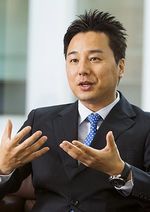“Integrity” Connects J Trust with Investors as It Reaches Out Beyond Boundaries
J Trust (Securities Code 8505, TSE 2nd Section) is a holding company with businesses centering on financial services on a global scale. With banking businesses in South Korea and Indonesia now in its portfolio, the company has more financial assets outside Japan than domestically. Recently, J Trust has been zealously enhancing its investor engagement, which has been highly recognized by investors. We have interviewed Mr. Nobuiku Chiba, Representative Director and Senior Managing Executive Officer on why J Trust is gaining recognition and what they wish to accomplish.

Representative Director & Senior Managing Executive Officer
In charge of financial business in South Korea & PR/IR Division
Born in Hokkaido in 1973, Chiba has worked on management in various J Trust group companies, serving as Vice President & Director of J Trust since 2008, President & Representative Director of Station Finance (now Nihon Hoshou) since 2009, Director of JT Chinae Savings Bank in South Korea since 2012 (incumbent).
Transparent disclosure , regardless of performance.
──Let us start out with asking why J Trust is strengthening its IR.
Chiba: At J Trust, IR stands not only for Investor Relations but for “Integrity Relations”. That is, we place great importance on “integrity”. Even when we close a year with undesirable results, as a matter of fact, the worse our figures the more we would like to make sure we provide sufficient information to our investors.
For example, we had a current net loss for our FY2015, which leads to lower PBR of the company. This was a result of writing off bad loans when we started banking businesses overseas. It was the first time we posted a net loss since Nobuyoshi Fujisawa, our current president, became the largest shareholder through a TOB.
J Trust has been buying failed banks in Asian nations and then reviving them to continue a community based business. We are frequently asked whether we are a “PE fund that revives companies and sells them off for more”, which we are not. One of the reasons we are putting more efforts in IR is to communicate the nature of J Trust business.
──You probably need to elaborate on J Trust’s basic concept of the “strictly contrarian”.
Chiba: Exactly. To describe J Trust in a word, we are a company that continues to challenge. For example, many said “a Japanese company will not be able to succeed” when we entered the South Korean’s savings bank industry in 2012. However, look at our South Korean financial business, it is growing.
I admit that our ideas could be contrary to what you might think. Having said that we clearly identify the risks involved, and by embracing such risks, transform them into our muscles. Of course, let me emphasize that we do not just want to bring success to our company through our contrarian approach. We would like to provide financial services that can truly satisfy our customers. We hope investors could understand and support this philosophy of ours.
Fast and comprehensive information disclosure policy to overseas investors.
──Is there any specific characteristic to J Trust’s IR?
Chiba: Prior to heading J Trust’s IR Division, I served as COO at one of the group companies. I have thorough knowledge of what actually goes on in the front lines of business, and would like to genuinely communicate the true voice. I also feel it is important to release clear-cut information in a timely manner.
To give you an example, I think that summaries of financial statements based on the requirements from the Stock Exchange are insufficient. We produce the “Earnings Presentation Materials” and other supplementary materials for investors and release as much information as possible.
We have also increased the frequency of earnings conference from twice a year to four times a year, on a quarterly basis. A video recording of the conferences with English voiceover and subtitles can be viewed on our corporate website, too.
──Does J Trust have any special IR strategy for targeting overseas investors, too?
Chiba: For the last three years, approximately 30% of our investors are overseas. So we now create all financial statement related material in both Japanese and English. We also try to announce all news releases at a fixed time of the day which is 4p.m. (JST) and they are available in both Japanese and English.
──And you went on overseas roadshows in 2015?
Chiba: Yes, we went to the UK, North America and Asia and traveled the distance equivalent of about one and a half times around the globe in three months. Investors, both domestic and overseas, provide funding to companies like us that they do not manage themselves. This is something that requires a lot of courage, I think. We appreciate it, and thus have reaffirmed the importance of communication and the nurturing of trust with them.
While we have 4 to 5 times more opportunities to meet with domestic investors comparing to last year, face to face meetings with overseas investors came to us as an even fresher experience. By directly feeling the astounding amount of support we receive from investors, both domestic and overseas, has led to us gaining confidence that we can really create great businesses into the future. We will establish WIN-WIN relationships with our stakeholders and bring about businesses that can energize around the world.